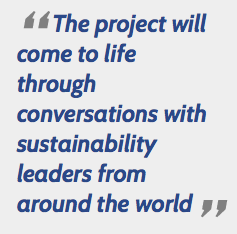In a recent article, How to Become a Sustainable Company, in the Summer 2012 issue of the MIT/Sloan Management Review they ask the question, “What differentiates sustainable companies from traditional ones?” To the answer in a minute.
Although the article references commitment to sustainability, noting that few companies are born with it, an issue arises for me that goes beyond terminology and suggests a fundamental misunderstanding – to be a sustainable company is not equal to being a company committed to sustainability. The adjective, sustainable and the noun sustainability are not one in the same. Unfortunately, the former is what is popular in business, both public and private and the answer to the question above demonstrates what I mean. According to the article the differences are:
- Sustainable organizations are effective at engaging with external stakeholders and employees
- They have cultures based on innovation and trust
- They have a track record of implementing large-scale change
These are not unique to sustainability nor to sustainable companies. Petroleum and toxin-based companies, for example, may be successful at all three and yet have no commitment to sustainability, to the seven generations, mired as their leadership may be in the short term, and, ultimately, in denial about global warming and the inability of an economic system that externalizes risk and costs to ever bounce back.
Sustainability is a goal, a desire, a hope and it signifies the ABILITY to drive change, first, at the personal level. We need sustainability leaders to drive a sustainability culture in their organizations. This point is raised in the MIT/Sloan report:
“When leadership commitment drives the process, it usually comes from the personal resolution of a CEO to create a more sustainable company. In general, top-level executives have the ability to create an enterprise-wide vision and the clout to see that it is realized. Without this commitment, becoming a sustainable company is a “nonstarter.”
While leadership commitment is talked about as critical, the report continues with the language of ” leaders of traditional and sustainable companies” rather than sustainability leaders of companies directing our attention to how things are not working rather than who is working. Our sustainability leaders need to influence their “traditional” peers, first, to raise their consciousness as quickly as possible. There are two very effective ways to advance the personal and model the behavior that is desperately needed.
Online Video
 Here’s an interview with Dominique Conseil , Global President of Aveda and Karl-Henrik Robert founder of the Natural Step, both sustainability leaders. Or listen to The Regeneration Project’s Ray Anderson Memorial video series, here is one video, Why Meaningful Progress Depends on Activists – Spotlight on Civil Society, featuring sustainability leaders Jonathon Porritt, Vandana Shiva, Nitin Desai, Lester Brown, Bill Ford, Kris Gopaladrishman, Yolanda Kakabadse and Gro Harlem Brundtland.
Here’s an interview with Dominique Conseil , Global President of Aveda and Karl-Henrik Robert founder of the Natural Step, both sustainability leaders. Or listen to The Regeneration Project’s Ray Anderson Memorial video series, here is one video, Why Meaningful Progress Depends on Activists – Spotlight on Civil Society, featuring sustainability leaders Jonathon Porritt, Vandana Shiva, Nitin Desai, Lester Brown, Bill Ford, Kris Gopaladrishman, Yolanda Kakabadse and Gro Harlem Brundtland.
Online Video and Research
Face-to-Face
The Regeneration Project, between July and October, will host a number of Salons – curated, facilitated conversations  with influential stakeholders from across industry and sector. These Salons will take place in major international cities across the world. Attendance is to be limited to approximately 50 people, on an invitation-only basis. Great work and hopefully the start of something fresh in sustainability awareness, education, and innovation. The project is an inititiave of GlobeScan, a public opinion research company and Sustainability, a think tank and strategy consultancy.
with influential stakeholders from across industry and sector. These Salons will take place in major international cities across the world. Attendance is to be limited to approximately 50 people, on an invitation-only basis. Great work and hopefully the start of something fresh in sustainability awareness, education, and innovation. The project is an inititiave of GlobeScan, a public opinion research company and Sustainability, a think tank and strategy consultancy.
All of this is to say go ahead and read the research digging into sustainable companies, but give more time to listening to your peers who are sustainability leaders, pioneers, heroes, and innovators. Look for research and events that emphasize the personal over organizational. Rely less on processed information when you can now hear directly from the sustainability leadership as found in the hundreds of companies that are for-benefit and in the hundreds of voices of sustainability from across the Web, the reason we invested in bringing together these voices for you in one place, EarthSayers.tv, voices of sustainability.
Ruth Ann Barrett, Sustainability Advocate, June 19, 2012, Portland, Oregon.
